- Home
- Lynne Olson
Those Angry Days Page 7
Those Angry Days Read online
Page 7
Con was the person to whom Anne confided her most private thoughts and emotions. “We understand each other so perfectly,” she wrote in her diary, noting “the intense pleasure of talking to Con about everything.” In a letter to Lindbergh before they were married, Anne bemoaned her difficulty in communicating to him exactly what she thought, adding, “Do you feel it—this wall? Why can’t I write you as I could write Con?”
Con and Anne had drawn even closer after the 1934 death of their sister, Elisabeth, who had suffered from heart disease since childhood. Two years before she died, Elisabeth had married Aubrey Morgan, a Cambridge University graduate and an heir to a Welsh department store fortune. Witty, outgoing, and cultured, Morgan became a valued member of the Morrow household and remained so after Elisabeth’s death. A good friend of both Anne and Charles, he accompanied Charles each day to the Hauptmann murder trial. When the Lindberghs moved to Britain, he sailed ahead of them so he could meet them when they arrived and take them to the privacy of his family home in Wales, where they stayed for several weeks.
Elizabeth and Con Morrow joined the Lindberghs in Wales for a short visit. While there, Con informed Anne that she and Aubrey were engaged. Jolted at first by the news, Anne came to the conclusion, as she wrote in her diary, that “yes, it is right—right for her, right for him.” A man who loved to laugh, Morgan was described by his friend, the noted British historian John Wheeler-Bennett, as “warm, fearless, and utterly delightful, full of initiative and imagination … and a contempt for all pomposity, official or unofficial.” That description summed up Con as well. The two had gravitated toward each other in their grief over Elisabeth’s death, and in the process, had fallen in love. Years later, Reeve Lindbergh would write: “Although many people … have considered the story of Elisabeth and Aubrey a romantic one, I for one have never thought that dying young counted for much in the way of romance.… The story of Con and Aubrey, on the other hand—now, there was romance for you!”
Soon after the couple’s marriage, Anne wrote Con: “How wonderful that C. and you, and Aubrey and C., and Aubrey and I, and you and I get on so well.… It does make for security ahead.” But that sense of well-being was threatened almost as soon as the Lindberghs returned home from Europe. In the summer of 1939, Sir Robert Vansittart, the British government’s chief diplomatic adviser, privately recruited Aubrey Morgan and John Wheeler-Bennett to play major roles in a campaign to convince Americans they must come to the aid of Britain in the event of war—the very thing that Charles Lindbergh was determined to prevent.
Aubrey Morgan, Anne and Charles Lindbergh’s brother-in-law and one of Britain’s chief propagandists in America during World War II.
EVEN BEFORE THE WAR began, the British were acutely aware that it could not be won without the help of the United States. To get that help, they knew they would have to appeal not only to the U.S. government but to the American people as well. They also knew what a formidable task that would be, given the considerable anti-British feeling that existed among Americans.
There was, to begin with, the vestigial suspicion and dislike of Britain as the tyrannous great power from which the United States had won its independence. “Anglo-American relations began in conflict, and that conflict has never been far beneath the surface,” noted a British diplomat in Washington. Senator Burton Wheeler, who would soon emerge as the most influential isolationist lawmaker in Washington, recalled how, as a child in suburban Boston, he loved to watch the reenacted battles between costumed American rebels and British soldiers every July 4. “No colonist in 1775 ever cheered louder than I did when a redcoat bit the dust,” Wheeler remembered. “We had been steeped in the lore of the Revolution, and I still bore a grudge against John Bull.”
In the country’s early years, Thomas Jefferson’s Republicans and their successors, Andrew Jackson’s Democrats, had cast themselves as populists, in direct opposition to the Eastern elites, who, in the public’s mind, were too closely associated with the snooty British and their rigid class system. Virtually every U.S. populist movement since that time has contained significant strains of nativism and antielitism. In the early 1900s, Benjamin Tillman, a prominent populist senator from South Carolina known as “Pitchfork Ben,” was fond of thundering: “America for Americans, and to hell with Britain and her Tories!”
Throughout the late nineteenth century and well into the twentieth, a sizable percentage of U.S. farmers blamed greedy British investors and ruthless Wall Street bankers for their many economic problems, including high railroad shipping rates and an inability to get cheap credit. According to one historian, Midwest and Great Plains farmers felt themselves “the innocent pastoral victims of a conspiracy hatched in the counting houses of New York and London.”
Britain’s imperialist policies also drew considerable fire, with some critics claiming that the British were far worse in their treatment of those they had colonized than Nazi Germany was to Jews and others under their subjugation. One such detractor was Senator D. Worth Clark, an isolationist Democrat from Idaho, who declared on the floor of the Senate in 1939: “Paint me a picture of the six years of persecution of the Jews, the Catholics, and the Protestants in Germany, paint it as gory and bloody as you please, and I will paint you one ten times as brutal, ten times as savage, ten times as bloody in the years of British destruction, pillage, rape and bloodshed in Ireland.” Notwithstanding the hyperbole of Clark’s statement, there was no question that many if not most Irish Americans were hostile to Britain, as were a good number of German Americans.
In the late 1930s, an Irish American congressman named Martin Sweeney proposed that the United States adopt a new national anthem, sung to the tune of “God Bless America” and containing these lyrics:
God save America from British rule:
Stand beside her and guide her
From the schemers who would make her a fool.
From Lexington to Yorktown,
From bloodstained Valley Forge,
God save America
From a king named George.
To be sure, the British government had not helped its cause in the United States by its seemingly blind determination to appease both Hitler and Mussolini. The news of Neville Chamberlain’s sellout of the Czechs to Hitler at Munich was greeted in America with shock and outrage. After a trip to New York in December 1938, Anthony Eden, who had resigned as British foreign secretary over Chamberlain’s appeasement policies earlier that year, remarked that the prime minister had managed to “lose American sympathy utterly. While I was there, most of my time was spent in asserting that Neville was not a fascist.”
A few months later, Robert Bruce Lockhart, a bestselling author and former British diplomat, saw for himself what he called “the melodramatic and almost hysterical attitude of the Americans toward Britain.” During a three-month lecture tour in the United States, he encountered considerable anti-Nazi sentiment, but, to his surprise, discovered that “criticism of the British government was even more bitter.” In one city, he saw women wearing tiny white piqué umbrellas as lapel pins—a mocking salute to Chamberlain’s trademark umbrella that had come to symbolize appeasement.
It was essential that the British act soon to combat such hostility and anger, but they had to tread extremely carefully. A good part of Americans’ antagonism toward Britain in the late 1930s stemmed from the British government’s sophisticated—and successful—propaganda campaign some twenty years before to draw America into World War I. Many Americans came to believe that their country had entered the war not because its own national interests demanded such action but because it had been tricked by the scheming, duplicitous British. And they were determined not to let it happen again.
BEWARE THE BRITISH SERPENT! screamed the headlines of posters plastered on the walls of buildings in Chicago and other Midwestern cities in late 1939. In smaller type, the posters declared: “Once more a boa constrictor—‘Perfidious Albion’—is crawling across the American landscape, spewing fo
rth its unctuous lies.”
Prominent Britons who, like Bruce Lockhart, traveled throughout the country on lecture tours found themselves the objects of considerable anger and suspicion. Arriving in San Francisco, Duff Cooper, who had resigned as first lord of the Admiralty in protest over the Munich agreement, was greeted by a crowd of unruly protesters waving giant cardboard lollipops emblazoned with the slogan “Don’t Be a Sucker for British Propaganda.” After his own tour, the British literary critic William Empson ruefully wrote: “There were times when I felt quite sure that if I had stood on my head and sung ‘Three Blind Mice,’ [my American hosts] would have wondered why the British government had paid me to do that.”
Highly sensitive to American ill will, the British government had forbidden any more official propaganda or special pleading campaigns in the United States. The only remnant of its World War I effort was a small press bureau, known as the British Library of Information, that continued to function, albeit somnolently, in New York. Unbeknownst to his superiors at the Foreign Office, Sir Robert Vansittart, who had been one of the most outspoken antiappeasement figures in the British government, decided to turn the library into a press intelligence unit, whose first assignment would be to closely monitor American public opinion and then, in the future, try to influence it. To do that, he needed Britons who not only knew the United States but who got along well with Americans and were in a position to sway their views.
In Vansittart’s opinion, Lindbergh’s brother-in-law, Aubrey Morgan, fit the bill perfectly. So did John Wheeler-Bennett. Left a fortune by his father, a wealthy London importer, the gregarious Wheeler-Bennett had lived in the early 1930s in Germany, where he witnessed the rise of Hitler, wrote several books on diplomacy, and, being violently anti-Nazi, barely escaped arrest by the Gestapo. Soon afterward, he became a lecturer on international relations at Oxford and later took on the same role at the University of Virginia.
Wheeler-Bennett’s maternal grandmother had been a Virginian, and from childhood he had been enamored of the United States, particularly the South. Distantly related to A. P. Hill, a noted Confederate general, he became an expert on the Civil War and spent much of every year teaching in Charlottesville. His students at the university included the president’s son Franklin D. Roosevelt Jr., who in January 1939 invited him to spend a weekend at the White House, where FDR pumped him for information about the Munich agreement.
Both John Wheeler-Bennett and Aubrey Morgan were appalled at “the spirit of lethargy” they found at the British Library of Information. On his own initiative and using his own money, Morgan set up a team of writers to gather information about America’s mood, much of it found in U.S. newspaper articles and radio broadcasts, and to write reports on the material, which were then sent to Whitehall and the British embassy in Washington. Employees of this new survey department, known as the “clip club,” included some good friends of Morgan’s, his private secretary, and his twenty-five-year-old wife.
Morgan himself began to make contacts with prominent American journalists and pro-British members of the East Coast establishment. Soon, as the historian Nicholas Cull has noted, “a river of intelligence was flowing into his office. It would be a relatively modest task to switch the direction of this tide and transform [it] from a receiving office for information on public opinion into a full-blown propaganda agency.”
For the British, this new offensive had come none too soon. The “gathering storm,” as Winston Churchill called the war threatening Europe, was about to break at last.
CHAPTER 4
“YOU HAVEN’T GOT THE VOTES”
On the surface, it seemed like the start of a typical Labor Day weekend. Americans were making their final trips to the beach and other favorite summer spots, getting ready to put up their sailboats, store their fishing rods, and head back to the routines of home and work. At thousands of country clubs and roadhouses across the country, the last music of the season played late into the night. Large crowds, taking advantage of the long holiday weekend, flocked to the 1939 New York World’s Fair.
Earlier that summer, Charles and Anne Lindbergh had finally found a home of their own—a big white clapboard house on the north shore of Long Island, perched high on a hill overlooking Long Island Sound. After a violent thunderstorm the previous night, Friday, September 1, dawned dazzlingly bright, and Anne decided to take a walk on the beach below the house. Before she did, she turned on the radio for the latest news broadcast—and learned that Germany had just invaded Poland. In a daze, she headed for the beach, where she walked for hours, trying, as millions of other Americans were doing, to comprehend the momentous news.
On September 3, after two days of dithering, the British and French governments finally lived up to their pledges to Poland and declared war on Germany. That night, President Roosevelt went on the air to proclaim America’s neutrality in the conflict. Yet he also made clear that he had no intention of asking Americans to be “impartial in thought as well as in action,” as Woodrow Wilson had done at the start of World War I. “This nation will remain a neutral nation,” FDR declared, “but … [e]ven a neutral has a right to take account of facts. Even a neutral cannot be asked to close his mind or his conscience.”
After this subtle indication of support for the Western allies, Roosevelt went on to pledge: “I hope the United States will keep out of this war. I believe that it will. And I give you assurance and reassurance that every effort of your government will be directed to that end.” At a press conference the following day, he tried again to soothe the country. “There is no thought in any shape, manner or form, of putting the nation, either in its defenses or in its internal economy, on a war basis,” he told the reporters crowded around him. “We are going to keep the nation on a peace basis.”
According to the noted playwright Robert Sherwood, who would become a top FDR aide less than a year later, these statements “were probably the weakest words that Roosevelt ever uttered. He was outdoing even Warren Harding by getting the country ‘back to normalcy’ before war had really started.”
But what else could he do? He was boxed in by the antiwar mood of both the public and Congress. Stickers declaring KEEP THE U.S. OUT OF WAR adorned car windshields all over America within days of the British and French declaration. A French journalist based in New York observed: “This country is literally drunk with pacifism. The war as an absolute evil in itself has become a mysticism. One no longer dares to pronounce the word nor to think of it except with pious horror. To spare our boys has taken on the value of a national mission.”
Yet Roosevelt, while pledging to keep the country out of war, was still determined to come to the aid of Britain and France through repeal of the arms embargo provision of the neutrality law. Persuading Congress to authorize “cash and carry” for arms shipments to the Western allies would become the administration’s primary objective for the fall of 1939 and the first wartime decision to face America. As the president knew only too well, it would be an excruciatingly difficult battle.
LESS THAN TWO MONTHS before, on a hot July night, Roosevelt had invited key senators from both parties to the White House in a last-ditch effort to persuade them to amend or repeal the Neutrality Act before war broke out. After the senators poured drinks for themselves from an array of liquor bottles on a side table, Roosevelt and Secretary of State Cordell Hull argued that the world was on the brink of catastrophe and pleaded with the lawmakers to allow America to throw its weight on the scales before it was too late.
Leaning back in his chair, Senator William Borah shook his leonine head in cool disdain. The seventy-four-year-old Republican from Idaho had heard all this before. A member of the Senate since 1907, he had been that body’s fiercest and most influential proponent of isolationism since he helped spearhead the congressional battle against Woodrow Wilson and the League of Nations in 1919. When Wilson, stymied by the Senate, embarked on a speaking tour of the nation to make his case for the League, Borah and a band of like
-minded senators followed him everywhere, arguing the opposite to huge crowds. Thanks in no small part to Borah’s persuasive oratory, public opinion turned against the League, and Wilson, his health broken by a stroke, saw his cherished dream go down to defeat.
Now Borah looked at Roosevelt, then at Hull. “There is not going to be any war in Europe this year,” he snapped. “All this hysteria is manufactured and artificial.” Struggling hard to keep his voice calm, the secretary of state said he wished the senator “would come to my office and look over the cables coming in. I feel satisfied he would modify his views.” Borah dismissed Hull’s comment with a contemptuous wave of his hand. He had, he replied, “sources of information in Europe that I regard as more reliable than those of the State Department.” They had told him “that there is not going to be any war.”*
Dumbfounded by what the columnist Joseph Alsop later termed Borah’s “inconceivable arrogance,” a white-faced Hull lapsed into silence. Roosevelt, for his part, retained his customary jaunty good humor, at least outwardly, even when his vice president, John Nance Garner, announced to him: “Well, captain, we might as well face the facts. You haven’t got the votes, and that’s all there is to it.”
As Roosevelt was well aware, he hadn’t had the votes for much of anything in Congress over the past several months. Largely because of his own political miscues, a powerful coalition of Republicans and conservative Democrats had been successful in defeating several major pieces of legislation advocated by the administration. In early 1939, when Democratic congressional leaders urged their dissident colleagues to stick together and support FDR, one of the rebels responded: “Congress has done all the cooperating in the past. It’s up to the President to do some now.”
The extent of the president’s loss of influence had been immense. When he first took office in 1933, he could do no wrong. The American public, facing economic catastrophe and yearning for strong leadership, supported virtually every program he proposed, and Congress marched behind him in lockstep.

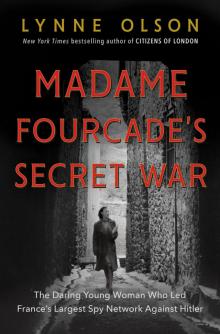 Madame Fourcade's Secret War
Madame Fourcade's Secret War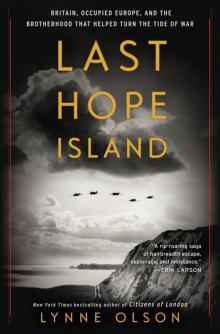 Last Hope Island
Last Hope Island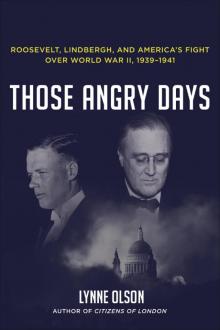 Those Angry Days
Those Angry Days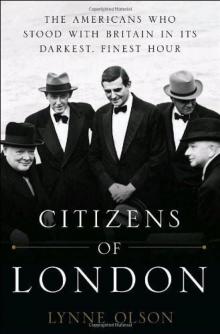 Citizens of London
Citizens of London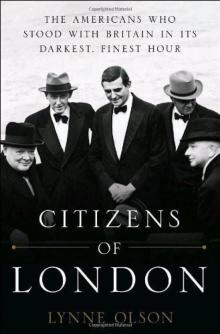 Citizens of London: The Americans Who Stood With Britain in Its Darkest, Finest Hour
Citizens of London: The Americans Who Stood With Britain in Its Darkest, Finest Hour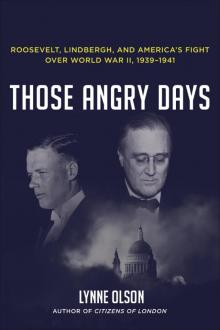 Those Angry Days: Roosevelt, Lindbergh, and America's Fight Over World War II, 1939-1941
Those Angry Days: Roosevelt, Lindbergh, and America's Fight Over World War II, 1939-1941